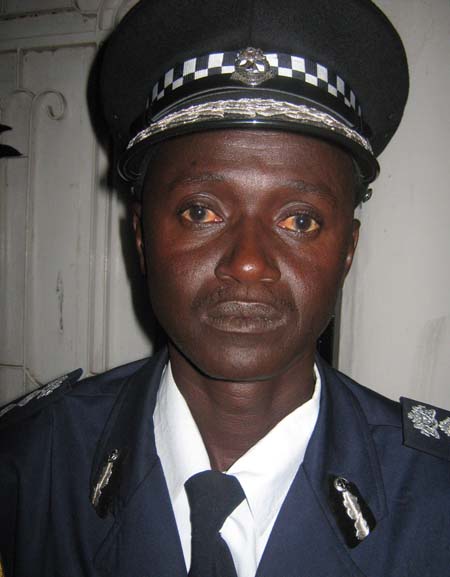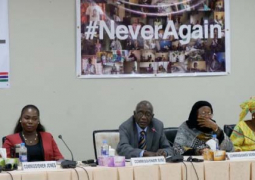
Jailed former police chief, Ensa Badjie, yesterday opened his defence in another case involving him and Tijan Badjie, former officer commanding the police prosecution unit Banjul Division, at the Banjul Magistrates’ Court before Principal Tawio Ade Alagbe.
The duo are standing trial on a four-count charge of conspiracy to defeat justice, destroying evidence, abuse of office and deceiving witnesses.
Badjie, who is already serving a life imprisonment on robbery related offences, told the court that he was enlisted into the Gambia police force in March 1987 and rose through the ranks before being appointed as the Inspector General of Police.
He said he was the police commissioner for West Coast Region when the crime rate was higher in that region.
Badjie further revealed that he was also the crime management coordinator (CMC), before being appointed as Inspector General of Police, in July 2008.
Ex-police chief further told the court that he recognised the 2nd accused, Tijan Badjie, as his co-accused.
He said that when Burama Dibba was arrested, he (Badjie) was the police commissioner of West Coast Region and by then Burama Dibba was his senior in the service, adding that he had no power, neither the authority to arrest him.
He pointed out that when Bumara Dibba was arrested, Benedict Jammeh, was the then IGP, further pointing out that he was never part of the panel that investigated ex- CMC Burama Dibba, and Superintendent Ebrima Kungi Jammeh, the former officer commanding the serious crime unit, and Musa Susso.
Badjie added that this particular panel was headed by the present Inspector General of Police, Yunkuba Sonko, and six other members and that NIA personnel also attended that panel.
“I was never part of that panel that investigated Musa Susso as well,” he told the court.
He said Musa Susso was recorded by Burama Dibba in the interview on an allegation made by Susso that he painted two prison trucks on behalf of the prison.
He said Musa Susso further alleged that one Ndey Conteh gave a satellite disc to the prisons for inmates, but David Colley, ex-prison DG, converted it to his own use.
According to him, Musa Susso also alleged that drugs were manufactured at the prison, and Lang Conteh, a convict, when he was released from prison had his 36-inch television full of cocaine.
However, the Director of Public Prosecutions (DPP), S.H. Barkun, raised an objection that what the witness was telling the court was hearsay, which was not admissible according to the Evidence Act.
DPP further argued that if what the witness was saying was true, the investigation would have come up with something like that, but what he was explaining was totally out of context.
Responding to the objection, defence counsel Borry S. Touray told the court that the DPP’s objection was misleading the court, and it had no relevance to what the witness was saying.
Badjie continued, and told the court that when the panel completed their investigation, as crime management coordinator, the report was filed with him and he later attached a covering note to the report and forwarded it to the administration division of the police.
Ex-IGP Badjie told the court that the administration also forwarded the report to Benedict Jammeh, who was the then Inspector General of Police, who also forwarded the file to the AG’s Chambers for legal advice.
He added that Burama Dibba was later charged with the offence of giving false information to a public officer, for which he was later acquitted and discharged.
The case at that juncture was adjourned till 27 September 2012.


